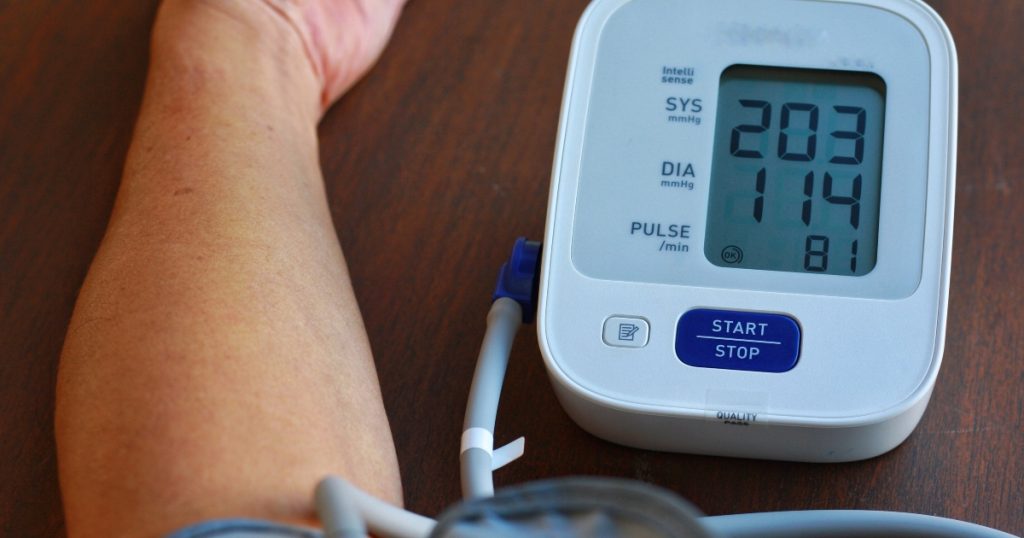How Long Can You Have High Blood Pressure Before It Causes Damage? Understanding the Impact and Risks
Did you know that approximately 1.2 billion people worldwide are affected by high blood pressure, making it one of the most widespread and concerning health issues on the planet?
High blood pressure, also called hypertension, can exist for years without noticeable symptoms, leaving us unaware of the potential damage it may inflict upon our bodies. But how much time do you have before the damage becomes irreversible?
In this article, we dive into the depths of this concern to help you understand the impact and risks of untreated high blood pressure.

Master your heart health now
Take part in our 60sec quiz and get a heart health plan tailored just for you.
Contents
What Is Considered a High Blood Pressure?

High blood pressure is when the force of blood flowing through your blood vessels is consistently too high.
Blood pressure is measured in millimeters of mercury (mmHg) and is expressed as 2 numbers: systolic pressure and diastolic pressure. For example, if a blood pressure reading is 120/80mmHg, the systolic pressure is 120mmHg, and the diastolic pressure is 80mmHg.
Systolic Pressure: This is the higher number in a reading and represents the force of blood flow against the arterial walls when the heart contracts and pumps blood out.
Diastolic Pressure: This is the lower number in a reading and represents the force of blood pushing against the arterial walls when the heart is at rest between beats.
Keeping your blood pressure healthy is essential to your overall health. Uncontrolled high blood pressure can strain the arteries and the heart, increasing the risk of heart disease, stroke, heart attack, kidney damage, and other serious health issues.
As per the American Heart Association (AHA) blood pressure guidelines, the categories are as follows:
| Blood pressure type: | Systolic pressure: | Diastolic pressure: |
| Normal blood pressure | <120mmHg | <80mmHg |
| Elevated blood pressure | 120–129mmHg | <80mmHg |
| Hypertension stage 1 | 130–139mmHg | 80–89mmHg |
| Hypertension stage 2 | >140mmHg | >90mmHg |
| Hypertensive crisis | >180mmHg | >120mmHg |
A person is considered to have high blood pressure if their readings fall into any of the following categories:
- Systolic blood pressure consistently above 130mmHg
- Diastolic blood pressure consistently above 80mmHg
- Blood pressure readings fall into the hypertension stage 1 or hypertension stage 2 categories mentioned above
If your blood pressure readings suddenly exceed 180/120mmHg, you could be experiencing a hypertensive crisis. If readings are constant after a few minutes, contact your health care professional immediately.
It’s important to note that blood pressure management and treatment should always be guided by qualified health care professionals. If you have concerns about your blood pressure, please consult health care professionals for personalized advice and proper evaluation.
Start managing your heart health now!
Find out what works for you with this 60sec quiz.

Duration of High Blood Pressure and Potential Damage
Uncontrolled high blood pressure poses a significant risk of serious health problems. In this section, we will explore the duration of high blood pressure and its potential impact on health in more detail.
Time frame for potential damage
High blood pressure can have variable effects on the body depending on several factors, including the severity and duration of high blood pressure, individual health conditions, lifestyle choices, and genetic predisposition. The impact of high blood pressure can occur over a period of months or years, and it’s essential to address and manage hypertension promptly to minimize potential damage.
Factors influencing damage from high blood pressure
Consistently high blood pressure places continuous stress on the artery walls and the entire cardiovascular system. Over time, this increased force can lead to damage in blood vessels, making them more prone to narrowing and weakening. The constant strain on the heart can also cause it to enlarge and weaken, potentially leading to heart attack and other cardiovascular conditions.
Other health conditions and risk factors can worsen the effects of high blood pressure, accelerating the damage to various organs and increasing the likelihood of complications. These include:
- Diabetes: People with diabetes are more susceptible to vascular damage due to high blood glucose levels, which can worsen the impact of hypertension on blood vessels and organs
- Obesity: Excess weight puts additional strain on the heart and blood vessels, further compounding the effects of hypertension
- Smoking: Smoking damages blood vessels, reduces oxygen levels, and increases heart rate, heightening the risks associated with high blood pressure
- High Cholesterol: Elevated cholesterol levels can lead to atherosclerosis and plaque formation in blood vessels, worsening the impact of hypertension
Managing underlying conditions and adopting a healthy lifestyle are essential in reducing the risk of damage and improving overall cardiovascular health.
Risks and Consequences of High Blood Pressure

Now that we discussed high blood pressure, we will explore its risks and consequences. It’s important to note that the most significant risks are heart disease and stroke.
Damage to the heart
High blood pressure places strain on the heart, leading to a higher risk of heart-related health problems, such as coronary artery disease, heart failure, and an enlarged heart. The continuous pressure on the arterial walls and the increased workload on the heart can result in structural and functional changes that affect cardiovascular health.
Impact on blood vessels
Healthy arteries feature a smooth inner lining, enabling the unobstructed flow of blood throughout the body. However, high blood pressure can have a damaging impact on the inner lining of blood vessels. As a result, it can lead to various vascular complications, including atherosclerosis, peripheral artery disease (PAD), and an increased risk of blood clots.
Start managing your heart health now!
Find out what works for you with this 60sec quiz.

Organ damage
High blood pressure can have detrimental effects on various organs in the body. To begin with, it can damage your arteries by making them less elastic, which decreases the flow of blood and oxygen to your heart. Decreased blood flow to the heart can cause chest pain, heart attack, and even heart failure.
Increased blood pressure also raises the risk of stroke and cognitive decline in the brain, contributes to kidney disease and impaired function, affects the eyes and vision, and may lead to erectile dysfunction in men.
Other health conditions
Hypertension is also associated with an increased risk of several other health conditions, including diabetes, metabolic syndrome, and certain types of dementia. It is crucial to note that while high blood pressure is associated with these health conditions, it does not necessarily mean that everyone with high blood pressure will develop them. Many factors contribute to the development of these conditions. Therefore, it’s important to manage high blood pressure and adopt a healthy lifestyle to help reduce the risk.
Impact on overall health
Blood pressure control is crucial for maintaining overall health and well-being. By preventing serious health complications, individuals can enjoy a better quality of life with increased energy, reduced healthcare costs, and a reduced burden on daily activities.
Prevention and Treatment Strategies

Knowing the consequences of hypertension, it’s important to familiarize yourself with ways of treating high blood pressure and even preventing it.
Lifestyle modifications
Being overweight can contribute to developing high blood pressure. Therefore, lifestyle changes play a significant role in preventing and managing the condition. A balanced diet, regular physical activity, and weight management play an important role in maintaining optimal blood pressure levels and cardiovascular health.
To get started, consider using helpful tools like the Cardi Health app. It offers personalized guidance in healthy diet and workouts, as well as tracking features to support your journey toward a healthier lifestyle. Use the app to achieve a healthy weight, lower your blood pressure with its tips, and improve your overall health.
Importance of blood pressure monitoring
Hypertension is often referred to as the “silent killer” because it typically presents no noticeable symptoms until significant damage has already occurred. Monitoring blood pressure regularly can help detect hypertension at an early stage and take necessary measures to prevent or minimize the impact of hypertension.
Self-monitoring at home, in addition to regular visits to health care professionals, empowers individuals to actively participate in their health management and reduces the risk of complications associated with high blood pressure.
Medical intervention and treatment options
Medical intervention, including the use of medication, plays a critical role in managing high blood pressure. However, it is essential to work closely with health care professionals to determine the most appropriate treatment plan tailored to your individual circumstances. The decision to prescribe medication is based on various factors, such as the patient’s blood pressure level, overall health, risk factors, and response to lifestyle modifications.
Start managing your heart health now!
Find out what works for you with this 60sec quiz.

FAQ
What exactly is high blood pressure?
High blood pressure occurs when the force of blood flowing through blood vessels remains too high consistently. Measurements include a systolic (higher) and a diastolic (lower) value, with a reading like 120/80mmHg.
Why is high blood pressure known as the “silent killer”?
Often showing no symptoms, hypertension can cause significant damage before it’s detected, underscoring the importance of regular monitoring.
How does high blood pressure affect our organs?
High blood pressure can damage arteries, reducing blood and oxygen flow to the heart, potentially leading to chest pain, heart attacks, or heart failure. It also increases the risks of stroke, kidney disease, and vision problems.
What steps can be taken to prevent or treat high blood pressure?
Adopting a balanced diet, engaging in regular exercise, managing weight, monitoring blood pressure, and following prescribed medical treatments are key strategies.
Conclusion
It’s important to treat high blood pressure because uncontrolled hypertension can lead to severe health problems, including heart disease, stroke, heart attack, and organ damage.
Regular blood pressure monitoring, both at home and during healthcare visits, is vital for early detection and prompt intervention. Taking charge of our blood pressure management through healthy lifestyle changes and adherence to medical advice can lead to a better quality of life, reduced risk of complications, and improved overall health. Start making changes with the Cardi Health app. It can guide you in your cardiovascular journey and help you treat and prevent high blood pressure with its tracking tools and scientific insights.
Related articles
Best Foods to Lower Cholesterol
Does Caffeine Raise Blood Pressure?
Does Drinking Water Lower Blood Pressure?
Causes of High Blood Pressure at Night
10 DASH Diet Breakfasts for a Healthy Start
Heart-Healthy Diet Guide
What Should an 85-Year-Old Blood Pressure Be?
What is Normal Blood Pressure for a 70-Year-Old?
How to Read Blood Pressure: A Comprehensive Guide
Manage your heart health now
Find out what works best for you with this 60sec quiz and get your personalized heart health plan.

